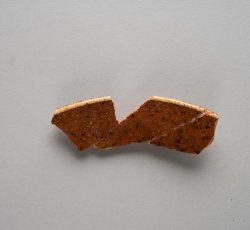House for Families - Page 1 of 18

Blue painted tin-glazed earthenware punch bowl.
Ceramic | Object ID: 1722581
These are fragments of a tin-glazed earthenware punchbowl, with a hand painted botanical band adorning the exterior rim. This ware is often referred to by archaeologists as delftware. The white coloration of the glaze was obtained by adding tin-oxide to a lead glaze. Against this white field, d...
Explore This Item
Colonoware hollow vessel rim.
Coarse Earthenware | Object #: 1719711
Unlike many of the other ceramics excavated from areas of Mount Vernon, this fragment was made locally of an earthenware called colonoware. Colonoware is an unglazed coarse earthenware fired at a low temperature, which is hand-built from local clays, rather than thrown on a potter’s wheel. The ...
Explore This Item
Colonoware bowl.
Coarse Earthenware | Object #: 1719728
Unlike many of the other ceramics excavated from areas of Mount Vernon, this fragment was made locally of an earthenware called colonoware. Colonoware is an unglazed coarse earthenware fired at a low temperature, which is hand-built from local clays, rather than thrown on a potter’s wheel. The ...
Explore This Item
Colonoware bowl.
Coarse Earthenware | Object #: 1721197
Unlike many of the other ceramics excavated from areas of Mount Vernon, this fragment was made locally of an earthenware called colonoware. Colonoware is an unglazed coarse earthenware fired at a low temperature, which is hand-built from local clays, rather than thrown on a potter’s wheel. The ...
Explore This Item
Colonoware bowl.
Coarse Earthenware | Object #: 1721351
Unlike many of the other ceramics excavated from areas of Mount Vernon, this fragment was made locally of an earthenware called colonoware. Colonoware is an unglazed coarse earthenware fired at a low temperature, which is hand-built from local clays, rather than thrown on a potter’s wheel. The ...
Explore This Item
Colonoware bowl.
Coarse Earthenware | Object #: 1721416
Unlike many of the other ceramics excavated from areas of Mount Vernon, this fragment was made locally of an earthenware called colonoware. Colonoware is an unglazed coarse earthenware fired at a low temperature, which is hand-built from local clays, rather than thrown on a potter’s wheel. The ...
Explore This Item
Colonoware bowl, everted rim.
Coarse Earthenware | Object #: 1721489
Unlike many of the other ceramics excavated from areas of Mount Vernon, this fragment was made locally of an earthenware called colonoware. Colonoware is an unglazed coarse earthenware fired at a low temperature, which is hand-built from local clays, rather than thrown on a potter’s wheel. The ...
Explore This Item
Coarse earthenware unidentified.
Coarse Earthenware | Object #: 1721775
Large limestone inclusions.
Explore This Item
Possible Iberian Redware unidentified body fragment
Coarse Earthenware | Object #: 1721781
Mica, limestone, gravel inclusions.
Explore This Item
Post-Medieval, London-area redware milk pan rim, large.
Coarse Earthenware | Object #: 1721839
This redware milk pan with a clear lead glaze on the interior of the vessel was likely made in London area potteries. Milk pans such as this example were often quite shallow and possessed a wide rim, which was often rolled for reinforcement. As the name suggests the vessel could be used for coo...
Explore This Item
Post-Medieval, London-area redware milk pan rim.
Coarse Earthenware | Object #: 1721888
This redware milk pan with a clear lead glaze on the interior of the vessel was likely made in London area potteries. Milk pans such as this example were often quite shallow and possessed a wide rim, which was often rolled for reinforcement. As the name suggests the vessel could be used for coo...
Explore This Item
Post-Medieval, London-area redware milk pan, large.
Coarse Earthenware | Object #: 1721897
This redware milk pan with a clear lead glaze on the interior of the vessel was likely made in London area potteries. Milk pans such as this example were often quite shallow and possessed a wide rim, which was often rolled for reinforcement. As the name suggests the vessel could be used for coo...
Explore This Item
Redware plate with yellow slipped rim.
Coarse Earthenware | Object #: 1722054
Mottled lead glaze interior.
Explore This Item
Redware mug/can.
Coarse Earthenware | Object #: 1722066
Slightly mottled exterior and interior glaze. Measurements taken from largest mended portion.
Explore This Item
Coarse earthenware vessel base.
Coarse Earthenware | Object #: 1722078
Lead glaze interior. Measurements taken from largest sherd.
Explore This Item

Red-bodied, black lead glazed holloware vessel.
Coarse Earthenware | Object #: 1722148
Bulbous body with handle terminal. Slightly everted rim. Possible teapot or pitcher. Measurements taken from largest mended portion.
Explore This Item
Red-bodied, black glazed holloware vessel.
Coarse Earthenware | Object #: 1722186
Mottled glaze. Wall curvature similar to mug/can.
Explore This Item
Red-bodied, black lead glazed holloware vessel.
Coarse Earthenware | Object #: 1722207
Thin walled vessel with minimal limestone, quartz, and gravel inclusions. Bubbled, crude glaze on exterior mended portion. Measurements taken from largest mended portion.
Explore This Item
Red-bodied, black lead glazed holloware rim.
Coarse Earthenware | Object #: 1722257
Thin walled, reduced fabric. Glazed interior and exterior.
Explore This Item
Staffordshire slipware trailed dish with pie crust rim.
Coarse Earthenware | Object #: 1722261
This fragment is a ceramic archaeologists refer to as North Midlands/Staffordshire type slipware. The word “type” is used here to denote the fact that coarse, slip decorated wares were actually produced in several regions of England throughout the seventeenth and eighteenth century. One feature...
Explore This Item